Updates on EUROPARC’s online conference!
As we announced at the beginning of June, the EUROPARC Conference 2021 that was scheduled to take place in Leeuwarden, the Netherlands is postponed to 2023 due to the pandemic. However, building on the great experience of last year’s online Conference, we are going online on the 6th and 7th of October with “Parks in the Spotlight Powered by People; Inspired by Nature. Find here updates on EUROPARC’s online conference!
With the “Spotlight” on Parks in many different policies both in the EU and worldwide, this conference is about championing what Parks can achieve, but it also aims to highlight what is needed for Parks to reach their full potential. Our conference will look at the practical management that turns political and societal topics, such as climate change, biodiversity restoration, health, tourism and economy (especially post covid), capacity building, technology, role of youth and agriculture into reality.
Workshops
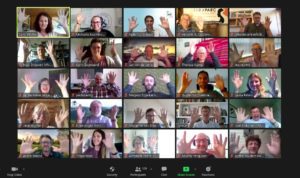
Happy faces at the online EUROPARC Conference 2020
Conference delegates will have the option to choose from 10 different workshops. In previous conferences, it was often a tough decision to decide on which workshops to follow, as they would take place at the same time. To eliminate this problem, the 10 workshops will be available on BOTH days! Additionally, we are working hard on making the workshops more participatory, so get out your thinking caps, as delegates will not just be observers, but also “doers”.
Of course, delegates can count on workshops related to all big EUROPARC topics including:
- Sustainable Agriculture
- Sustainable Tourism
- Youth involvement
- Climate Change
- Ecosystem Restoration
- Health
- Stakeholder Engagement
- Technological innovation
Speaker’s Corner
A proven format that we used last year will also make its return this year: the Speaker’s Corner. However, whereas last year presenters had 15 minutes, this year we’ve reduced the presentation time to 5 minutes! For one hour, 10 different presenters get the opportunity to “put the spotlight” on their projects. In this “speed dating format” the goal is to increase awareness about our members’ work and facilitate networking amongst our community.
As the enthusiasm of our members is generally unlimited and the number of presentation slots limited, a selection might be needed. Here is how it will be done:
- Applications will be selected by the Federation’s team to create a good cross-representation of projects covering the different aspects of Protected Area management.
- Projects highlighting work done on the ground, in response to big societal topics mentioned above will be favoured.
- The speaker’s corner is open to the EUROPARC Federation’s members in priority.
Registration for the Speaker’s Corner will open together with registrations to the conference.
Keynote speakers
As can be expected from a EUROPARC Conference, we will have stimulating Keynote Speakers to set the tone for the conference. We will reveal them in the upcoming months, so “watch this space”!
Registration
For now we ask you to save the date, but registrations for the conference will open in August! We look forward to welcoming everyone on the 6th and 7th of October.
General Assembly
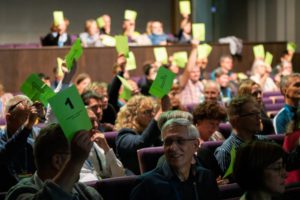
EUROPARC General Assembly 2019, Jurmala, Latvia – by Rolfs Vendis
Additionally, EUROPARC members are warmly invited to join on the 5th of October for our General Assembly. This year is extra special, as it is an election year. This also means that you can now nominate your candidates for Council and President! All info on the process can be found here. We look forward to receiving your nominations.
Updates from Georgia’s Protected Areas!
Mtirala National Park in Georgia © Agency of Protected Areas of Georgia
Good news from our friends & EUROPARC Member the Agency of Protected Areas of Georgia: the Colchic Rainforest and Wetlands have been nominated as UNESCO World Natural Heritage sites. Article issued by the Agency of Protected Areas of Georgia.
In 2019 the Colchic Rainforests and Wetlands were nominated as a UNESCO World Natural Heritage site. Sadly, due to the pandemic the committee session was postponed. The nomination will now be considered in July of this year. However, things are looking positive, as the International Union for Conservation of Nature (IUCN), an official advisory body to the World Heritage Convention on natural World Heritage, has recommended inscription of the Colchic Rainforests and Wetlands (Georgia) on the World Heritage List under World Heritage criteria ix and x. This means that, on the technical level, the nomination dossier as submitted by the State Party of Georgia has been fully supported through a comprehensive one-year IUCN evaluation process.
The reasons for nominating this site are numerous as it includes seven areas of rainforests, peatlands and mires in the Colchic, a distinct ecological region in Eurasia. The area at the eastern coast of the Black Sea experiences extremely hot and humid weather. This makes it a unique habitat for numerous species of plants and animals, including the Critically Endangered Colchic sturgeon (Acipenser colchicus). Additionally, the area holds the oldest broad-leaved forests – together with the Hyrcanian forests of Iran and Azerbaijan – in western Eurasia. These forests have survived the cycles of ice ages and count as some of the most humid nemoral broad-leaved rainforests globally.
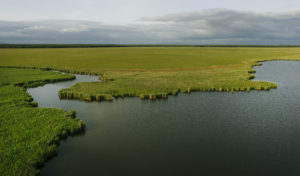
Wettlands of Kolkheti NP in Georgia
The nomination is quite the milestone, as for the first time in the history of Georgia, four Protected Areas: Mtirala and Kolkheti National Parks and Kintrishi and Kobuleti Protected Areas, as unique Colchic Rainforests and wetlands, were nominated for UNESCO World Natural Heritage.
Based on the IUCN recommendation, the final decision about the nomination will be taken by the World Heritage Committee at its extended 44th Session in Fuzhou (China), on 16-31 July 2021.
“Here, on behalf of the Protected Areas, we would like to honor the legacy of Mr. Nugzar Zazanashvili – Caucasus program director of World Wildlife Fund (WWF), who has made a truly special contribution to the successful preparation of this nomination, and we immensely thank him for his invaluable contribution to the protection and conservation of Georgia’s unique biodiversity” says the Agency of Protected Areas of Georgia.
EUROPARC looks forward to the final decision, and congratulates the Georgian Protected Areas on the achievement so far.
European Day of Parks 2021 – Parks: The Next Generation
On the 24st of May 2021 we celebrated the European Day of Parks. This year, we looked at how Parks responded to challenges of the past year with “Parks: The Next Generation”. Special attention was given also to young people, as they are the literal next generation of nature conservationists.
The outcomes of the European Day of Parks 2021
Many Protected Areas across Europe organised events in and around the 24th of May. The European day of Parks (EDoP) aims at bringing people closer to Nature by offering a diversity of activities and events in Protected Areas across the EUROPARC Network. The events addressed people of all ages: children, youngsters, young adults, families and seniors. However, as there were still quite a few restrictions in place across Europe, the event was still partly celebrated online. For that special occasion, we asked our members to send us One-Minute Video Messages, to which many happily responded!
There was quite a buzz on social media and we were happy so many participated in the European Day of Parks in one way or another. To get an overview of all that was happening in the media, have a look at our Media and Outreach report:
We want to thank everyone that made this European Day of Parks a success!
Promotional materials
The official banner was translated into 28 languages!
Albanian | Basque | Castellano | Catalan | Croatian | Czech | Danish | Dutch | English | Finnish | French | German | Greek | Hungarian | Italian | Latvian | Lithuanian | Macedonian | Norwegian| Polish | Portuguese | Romanian | Russian | Serbian | Slovakian | Slovenian | Spanish | Welsh
About the European Day of Parks
Imagine a day when all Parks and Protected Areas come together across Europe, celebrate their successes and declare the value and benefits of Europe’s Protected Areas to communities, decision-makers and the wider public. Well, it is EUROPARC’s European Day of Parks!
Every year European Day of Parks takes place on and around 24th of May. It aims to bring people closer to nature and raise public awareness on the importance of the natural beauty preserved in Protected Areas and the importance of conservation and sustainable management of those places.
Check here to see the previous editions.
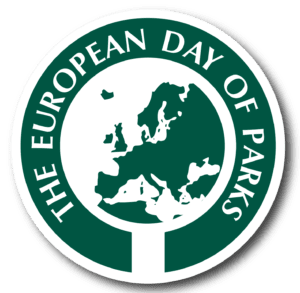
A first! The LIFEedu Virtual Summer School on Natura 2000 management
The LIFE e-Natura 2000.edu project is always innovative. This June participants could join the Virtual Summer School. Find out what they learned here:
From 7 to 17 June 2021, the “Natura 2000 in Practice” Virtual Summer School was held by LIFEedu project partner, the Department Land, Environment, Agriculture and Forestry (TESAF) of the University of Padova, for managers of Natura 2000 sites. As a part of the LIFE e-Natura2000.edu project, it capitalised on the project partners’ experience gains, who have collaborated throughout the project. Originally planned as a ‘live’ event, the Virtual Summer School was organised following more than one year of postponements due to the coronavirus pandemic.
The School aimed to disseminate in-depth knowledge on innovative aspects related to the management of Natura 2000 sites and develop practical, technical skills among participants about the ecological and planning tools required for appropriate management of these Protected Areas.
The School was designed to train public and private staff in the management and planning of Natura 2000 sites and apply innovative tools to adhere to the requirements of the Habitats Directive in Natura 2000 sites. The main topics included: understanding conservation status, conservation degree and favourable reference values of habitat types and species; examining pressures and threats, article 17 reporting requirements, site conservation objectives and measures; discussing restoration and monitoring actions, field surveys and remote sensing; practical methods to facilitate participatory processes, community outreach, communication and collaboration in Natura 2000 projects.
A number of different tools were used during the Virtual Summer School. All materials (registrations, videos, documents, weblinks, forum exchanges etc.) were made available via a purpose-built Moodle. Most of the sessions were conducted on zoom using MURAL, Zoom Pool and Mentimeter to stimulate participation and sharing of ideas. The Moodle page will continue to be available to participants to continuing sharing information and networking.
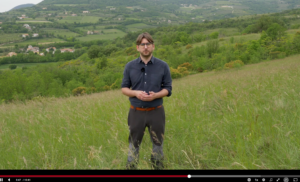
Thomas Campagnaro of TESAF in one of the virtual field trips
Virtual field visits were held with specially created videos to relate online maps on monitoring and management of habitat types and habitat of species in two Natura 2000 sites (“Colli Euganei – Monte Lozzo – Monte Ricco” IT3260017 and “Grave e Zone umide della Brenta” IT3260018). The sessions also presented experiences from other LIFE projects, namely: LIFE RedBosques project (LIFE15 GIE/ES/000809), LIFE “Brenta 2030” (LIFE18 NAT/IT/000756), LIFE PRIMED (LIFE17NAT/GR/000511).
The final online session was used to sum up the main outcomes of the Virtual Summer School and understand its impacts using an interactive evaluation for participants. This revealed general agreement about the “diverse topics and good lecturers and backup material”. Additionally, someone else noted that
The Summer School had been “a perfect undertaking to integrate the community of folks involved in N2K all across the continent”.
The School also generated a proposal for collaboration among participants regarding the use of digital learning techniques to support data collection and analysis with the aim of helping monitoring and appropriate assessments.
All in all, the Virtual Summer School highlighted the importance and interest of deepening understanding about methods to improve knowledge and awareness of Natura 2000 for site and LIFE project managers.
